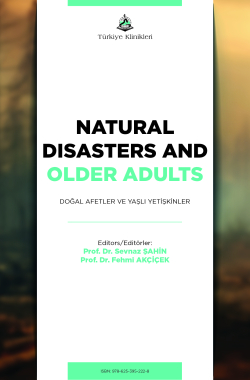Impact of Natural Disasters on Patients with Alzheimer’s Disease
Mustafa YILDIRIMa , Pınar SOYSALb , Sevnaz ŞAHİNa
aEge University Faculty of Medicine, Deparment of Geriatrics, İzmir, Türkiye
bBezmiâlem Foundation University Faculty of Medicine, Deparment of Geriatrics, İstanbul, Türkiye
Yıldırım M, Soysal P, Şahin S. Impact of natural disasters on patients with Alzheimer’s disease. In: Şahin S, Akçiçek F, eds. Natural Disasters and Older Adults. 1st ed. Ankara: Türkiye Klinikleri; 2024. p.34-8.
ABSTRACT
Alzheimer’s disease (AD) is the most common type of dementia. The prevalence of AD increases with age. Elderly individuals with a diagnosis of AD are one of the groups in society most vulnerable to disasters. The effects of disasters on patients diagnosed with AD may vary depending on the stage of the disease. The impact of a disaster on an individual varies depending on the post-disaster period and the affected state.
Keywords: Natural disasters; elderly; Alzheimer’s disease; dementia
Kaynak Göster
Referanslar
- Dubois B, Villain N, Frisoni GB, Rabinovici GD, Sabbagh M, Cappa S, et al. Clinical diagnosis of Alzheimer's disease: recommendations of the International Working Group. Lancet Neurol. 2021;20(6):484-96. [Crossref] [PubMed]
- Rajan KB, Weuve J, Barnes LL, McAninch EA, Wilson RS, Evans DA. Population estimate of people with clinical Alzheimer's disease and mild cognitive impairment in the United States (2020-2060). Alzheimers Dement. 2021;17(12):1966-75. [Crossref] [PubMed] [PMC]
- Eryılmaz M, Tezel O, Ulusoy S. Disaster: Definition and Classification. Köse Ş, editor. Disasters and Infections.1. Oppression. Ankara: Türkiye Klinikleri; 2021. p.1-5.
- Bell SA, Miranda ML, Bynum JPW, Davis MA. Mortality After Exposure to a Hurricane Among Older Adults Living With Dementia. JAMA Netw Open. 2023;6(3):e232043. [Crossref] [PubMed] [PMC]
- Miyagawa A, Kunii Y, Gotoh D, Hoshino H, Kakamu T, Hidaka T, et al. Effects of the Great East Japan Earthquake and the Fukushima Daiichi Nuclear Power Plant accident on behavioural and psychological symptoms of dementia among patients. Psychogeriatrics. 2021;21(5):709-15. [Crossref] [PubMed] [PMC]
- Furukawa K, Ootsuki M, Kodama M, Arai H. Exacerbation of dementia after the earthquake and tsunami in Japan. J Neurol. 2012;259(6):1243. [Crossref] [PubMed]
- Ishiki A, Furukawa K, Une K, Tomita N, Okinaga S, Arai H. Cognitive examination in older adults living in temporary apartments after the Great East Japan Earthquake. Geriatr Gerontol Int. 2015;15(2):232-3. [Crossref] [PubMed]
- Bishop LC, Thornby J. Psychiatric consultation with medical evacuees of Hurricane Katrina. Wilderness Environ Med. 2009;20(1):1-5. [Crossref] [PubMed]
- Yoshida S, Kashima S, Matsumoto M. The effect of the 2018 Japan Floods on cognitive decline among long-term care insurance users in Japan: a retrospective cohort study. Environ Health Prev Med. 2021;26(1):1-11. [Crossref] [PubMed] [PMC]
- Helms J, Kremer S, Merdji H, Clere-Jehl R, Schenck M, Kummerlen C, et al. Neurologic features in severe SARS-CoV-2 infection. N Engl J Med. 2020;382(23):2268-70. [Crossref] [PubMed] [PMC]
- Varatharaj A, Thomas N, Ellul MA, Davies NW, Pollak TA, Tenorio EL, et al. Neurological and neuropsychiatric complications of COVID-19 in 153 patients: a UK-wide surveillance study. Lancet Psychiatry. 2020;7(10):875-82. [Crossref] [PubMed]
- Singhal S, Kumar P, Singh S, Saha S, Dey AB. Clinical features and outcomes of COVID-19 in older adults: a systematic review and meta-analysis. BMC Geriatr. 2021;21(1):1-9. [Crossref] [PubMed] [PMC]
- Bianchetti A, Rozzini R, Guerini F, Boffelli S, Ranieri P, Minelli G, et al. Clinical Presentation of COVID19 in Dementia Patients. J Nutr Health Aging. 2020;24(6):560-62. [Crossref] [PubMed] [PMC]
- Alonso-Lana S, Marquié M, Ruiz A, Boada M. Cognitive and Neuropsychiatric Manifestations of COVID-19 and Effects on Elderly Individuals With Dementia. Front Aging Neurosci. 2020;12:588872. [Crossref] [PubMed] [PMC]
- Nakamura K, Watanabe Y, Kitamura K, Kabasawa K, Someya T. Psychological distress as a risk factor for dementia after the 2004 Niigata-Chuetsu earthquake in Japan. J Affect Disord. 2019;259:121-7. [Crossref] [PubMed]
- Hikichi H, Aida J, Kondo K, Tsuboya T, Matsuyama Y, Subramanian SV, Kawachi I. Increased risk of dementia in the aftermath of the 2011 Great East Japan Earthquake and Tsunami. Proc Natl Acad Sci U S A. 2016;113(45):E6911-8. [Crossref] [PubMed] [PMC]
- Long-term was defined as follow-up occurring at least one month after COVID-19 diagnosis as per the National Institute Clinical Excellence guidance, NICE GUIDANCE 188, 2021. COVID-19 rapid guideline: managing the long-term effects of COVID-19, 2020. [online] (Cited: 16 June 2023). Available from: [Link]
- Çavdar S, Şahin S. Effects of SARS-CoV-2 Pandemic on the Healthy Aging Process. Şahin S, Akçiçek SF, eds. SARS-CoV-2 Pandemic and Aging. 1st ed. Ankara: Türkiye Klinikleri; 2020. p.77-82.
- Soysal P, Smith L, Trott M, Alexopoulos P, Barbagallo M, Tan SG, et al. European Society of Geriatric Medicine Special Interest Group in Dementia an Systematic Reviews and Meta‐Analyses. The Effects of COVID‐19 lockdown on neuropsychiatric symptoms in patients with dementia or mild cognitive impairment: A systematic review and meta‐analysis. Psychogeriatrics. 2022;22(3):402-12. [Crossref] [PubMed] [PMC]
- Bayraktar N, Dal Yilmaz Ü. Vulnerability Of Elderly People In Disasters: A Systematic Review. Türk Geriatri Dergisi. 2018;21(3).
- Okamoto N, Greiner C. Displacement and older people: the case of the great east japan earthquake. The Journal of Humanitarian Studies. 2014;3:86-101.
- Gibson A, Walsh J, Brown LM. A perfect storm: Challenges encountered by family caregivers of persons with Alzheimer's disease during natural disasters. J Gerontol Soc Work. 2018;61(7):775-89. [Crossref] [PubMed]

